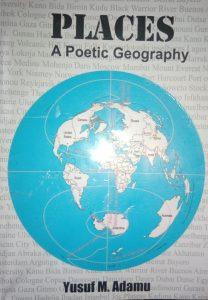Being a lover of beautiful places, I have always enjoyed reading travel stories, journals, brochures, pamphlets, and leaflets. The beautiful pictures of places I would love to visit usually provoke a mental picture of how lovely it would be for me to go to these places. For instance, deserted ever blue beaches with endless feathery sands, glittering skyscrapers with fabulous hotels with shimmering lights like those found in Singapore, Dubai and New York, and the sharp contrasts of high mountains.Lonely islands and very noisy and busy streets like that of Mumbaido not cease to captivate me. I often ponder about the unlimited adventures that I could undertake if I have the means to do so andAdamu’sPlaces afforded me the leverage to travel without taking an airplane.
Placesushers readers into a poetic world of beautiful towns in Nigeria and around the world. This one hundred and forty-two paged book, poetically introduced readers to incredible lands that can be better experienced than imagined. From the grandeurs of the Great Wall of China, to the ever-bustling city of New York: “the city that is always awake”, to yet another magical place called Machu Picchu where the “magnificent Inca masonry still lives on.” And in Nigeria, the poet resuscitates an endemic feeling of love for the rapid water of Gurara falls to the intricate network of roads and fabrication/imitation of goods in Onitsha. As the poet narrates how he sees these places, beautiful landscape pictures ensure that you are captivated. Adamu’s pitches poems with pictures of the places he talks about as an antic to draw readers’attention to these places.
At first, one would read about real places and the seriousness of people and events, however, the poet also hilariously identified places with similar names. For instance, the poem “Searching for Barcelona” engages readers on to a serious search of Barcelona in Spain. At the beginning of the poem, one may be perplexed to read that Barcelona cannot be located. As one reads further, anxiety takes over one’s imagination the reader is spellbound to unravel the mystery of locating Barcelona. By the second stanza, the search becomes even more mysterious as one gets to know that this Barcelona is in Abuja and in Wuse II to be exact. The question then is why would Barcelona be in Abuja of all places in the world? The third stanza finds the persona driving from major streets in Abuja with eyes fixed on every landmark that could aid quick identification of Barcelona. The persona finally locates Barcelona and the reader gets to know that the Barcelona that had been very difficult to locate, is actually a hotel in Abuja. A funny and engaging poem which incites a sense of relief as the personae finally locates Barcelona Hotel.


Most travel books are a narrative of extraordinary journeys, ordeals and discoveries. They excite readers with long narratives that move one’s imagination to another level. But Adamu’sPlaces is a different twist of literature, history and environmental concerns all added together. The History of Lokoja is narrated to educate readers about Lokoja being one of the first administrative headquarters of the British government in Nigeria during the colonial rule. The “Poles”(Antartic/Artic)extreme weather is contrasted with the desert. Readers are informed of formidable blocks of ice and life still present as polar bears, penguins, seals and whales still thrive very well despite the extreme cold weather. The scenario poetically brings to the fore God’s wonders of a world filled with so many marvelous things. Why I especially enjoyed reading Places is that important personalities we only read about seem to come to life in Places. The father of psychoanalysis, Sigmund Freud, is strategically named in “Vienna”. Also, great personalities such as Chekhov of Moscow, Mozart and Beethoven are appraised such that the reader would want to know more about these great persons.
Surprisingly, with the mention of technologically advanced cities of the world, the poet’s use of language is simple, down to earth. With the title,Places encompassing “geography”, one would think that peculiar terms such as stalagmite or stalactites would be referred to. But this is not the case. Words are exercised sparingly to create an ambience of comradeship in which the reader follows the poet around a beautiful world. The mention of meals unique to the cultures and traditions of certain places in the book directs one’s imagination to the humanness in all countries and cities of the world.The rich heritage of certain historic places are more emphasised by the poet’s use of everyday words in unusual way, thus highlighting the pros and cons of a place visited.
However, not all places bring memories of goodwill. Some like“Bida” reminds readers of the evils of colonial rule, nevertheless the people of Bida were able to overcome oppression by showcasing their prowess in brass making.These brass works are one of the best in Africa and by virtue of this skill, Bida is known the world over for making fine brass antiques.
Finally, Places ensures that a reader’s fantasy of the world is not exaggerated. Adamu in this collection of poems gets his readers to feel the supernatural gift of God in “Mecca” and “Medina”; then one comes to read about America’s policing of the world and international power play by the same America over other countries. Other poetic renditions exemplify how humans have learnt to stay connected in a big world all due to technological advancement. So, staying indoors does not mean that you cannot go to the places you have always wanted to go, instead, with Adamu’sPlaces, a reader is empowered to have the right of passage to any city or place of the world he/she so desires.
Linda Jummai Mustafa teaches Literature in English at Ibrahim Badamasi Babangida University, Lapai Niger State. She is interested in poetry and creative writing and has her poem published in The Markars (an anthology of poems on the menace of Boko Haram). She is a postgraduate student at the University of Ilorin, Ilorin, Kwara State.

